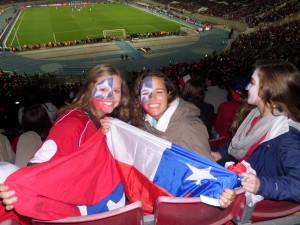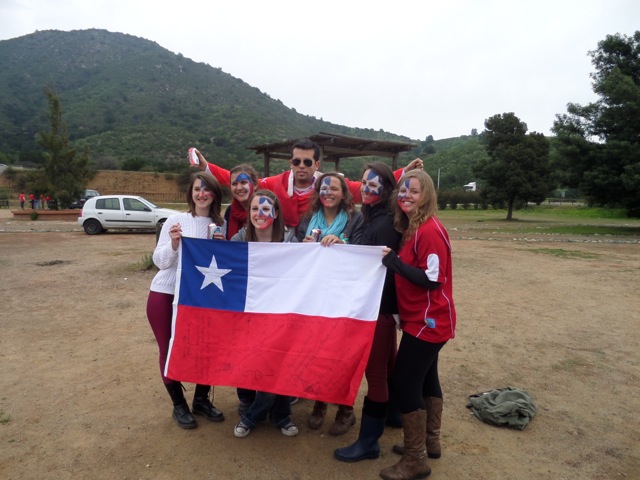The experience of being completely enveloped in a roaring crowd is one that will never lose excitement for me. Last Friday, I found myself settled deep in a mass of red, white, and blue that covered the Estadio Nacional in Santiago, belting out Chilean gritos or chants at the top of my lungs, and sometimes letting the roar of others enshroud me and resonate deep within my body. I had finally accomplished one of my life dreams and was attending the World Cup qualifier between Chile and Venezuela. I could not have been more enthused. However, this game wasn’t just a typical game, as it took place very close to the 40th anniversary of the Golpe de Estado of Chile on Septr. 11, 1973. During this historical event, the stadium in Santiago was used to contain over 12,000 Chilean prisoners of the state, most of whom were tortured within those walls, and some of whom never left the stadium. Knowing this information gave my trip to Santiago a whole new dimension. Like most things in this country, this game also had an underlying political theme.
We loaded the bus early Friday afternoon and set off to enjoy a hopefully end in a glorious victory over Chile’s greatest South American competitor, Venezuela. On our way to the stadium we stopped halfway between Valparaíso and Santiago in a beautful park tucked between two highways, close to the gorgeous mountain range so we could have a traditional Chilean cookout called an asado. It was at this stop that I learned about an Amnesty International’s campaign involving the Golpe de Estado. Amnesty International organized a campaign called Gol de Silencio which translates to mean ‘goal of silence’. They proposed that in order to respect the 12,000 individuals who were detained in the stadium, the fans of Chile withhold their cheers after the first goal that Chile made.

We made it to the stadium and were ready to enjoy what we considered to be the world’s greatest game. Although it was two hours before game time, the stadium was nearly filled to the brim. One thing I definitely couldn’t ignore was the obvious presence of the carabineros, or the Chilean police force. Seeing their presence brought me back to 40 years ago. Once again I was reminded of the role these government officials once had, and couldn’t help but get chills.
The game started, and pushing all morbid thoughts aside, I completely dived into the excitment of the game. Chile had great offense and was able to work the ball easily around the Venezuelan defense. We all waited with anticipation for the ball to find its way past the goalkeeper’s finger tips and into the net of the goal. After only ten minutes, Chilean forward Eduardo Vargas made the first goal! Out of mindless excitement I let out a huge cheer, but quickly stopped. I waited, but I didn’t hear silence. Chileans were cheering with more bravado than ever and I simultaneously felt a moment of celebration and disappointment. Yes, hearing the roar of the crowd was something magnificent, but I can only imagine how impactful complete silence would have been. The team went on to score two more goals, ensuring their success on the road to Brazil and the World Cup. It was the most incredible game I could have watched and an experience I’ll never forget.
On the bus ride home, amidst the flag waving and chants of ‘¡VIVA CHILE!’, I wrestled with what had just occurred after that first goal. Later, I came to two conclusions. First, the fans wanted nothing more than to celebrate that first goal, just like any other goal that has taken place in that stadium. They wanted to support the team and had no concern with politics at that moment in time. I also realized maybe this was a way for them to show their desire to move past this tragic event. Their inability to remain silent not only celebrated the goal that propelled their team to victory, but also portrayed their desire not to dwell on the pain of the past, but celebrate the present. This second realization made a lot more sense and portrays what I like to call the spirit of Chile. The people here are able to recognize difficulties, but do not linger on them. The most important thing I’ve learned so far from them on this study abroad adventure, is to do the same: acknowledge adversity, but realize that focusing on the present allows one to heal and grow from the experience. This soccer game was just another incredible opportunity to reinforce this mentality.
